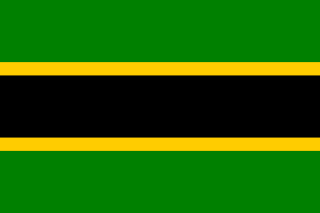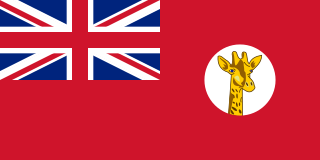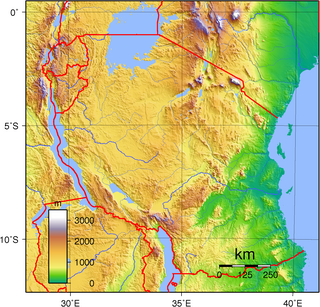
Tanzania, officially the United Republic of Tanzania, is a country in East Africa within the African Great Lakes region. It borders Uganda to the north; Kenya to the northeast; the Indian Ocean to the east; Mozambique and Malawi to the south; Zambia to the southwest; and Rwanda, Burundi, and the Democratic Republic of the Congo to the west. Mount Kilimanjaro, Africa's highest mountain, is in northeastern Tanzania. According to the 2022 national census, Tanzania has a population of nearly 62 million, making it the most populous country located entirely south of the equator.
The modern-day African Great Lakes state of Tanzania dates formally from 1964, when it was formed out of the union of the much larger mainland territory of Tanganyika and the coastal archipelago of Zanzibar. The former was a colony and part of German East Africa from the 1880s to 1919s when, under the League of Nations, it became a British mandate. It served as a British military outpost during World War II, providing financial help, munitions, and soldiers. In 1947, Tanganyika became a United Nations Trust Territory under British administration, a status it kept until its independence in 1961. The island of Zanzibar thrived as a trading hub, successively controlled by the Portuguese, the Sultanate of Oman, and then as a British protectorate by the end of the nineteenth century.

Zanzibar is an insular semi-autonomous province which united with Tanganyika in 1964 to form the United Republic of Tanzania. It is an archipelago in the Indian Ocean, 25–50 km (16–31 mi) off the coast of the African mainland, and consists of many small islands and two large ones: Unguja and Pemba Island. The capital is Zanzibar City, located on the island of Unguja. Its historic centre, Stone Town, is a World Heritage Site.

Tanganyika was a sovereign state, comprising the mainland part of present-day Tanzania, that existed from 1961 until 1964. It first gained independence from the United Kingdom on 9 December 1961 as a Commonwealth realm headed by Queen Elizabeth II before becoming a republic within the Commonwealth of Nations a year later. After signing the Articles of Union on 22 April 1964 and passing an Act of Union on 25 April, Tanganyika officially joined with the People's Republic of Zanzibar to form the United Republic of Tanganyika and Zanzibar on Union Day, 26 April 1964. The new state changed its name to the United Republic of Tanzania within a year.

Pemba Island is a Tanzanian island forming part of the Zanzibar Archipelago, lying within the Swahili Coast in the Indian Ocean.
Zanzibar is an autonomous part of Tanzania.

Abeid Amani Karume was the first President of Zanzibar. He obtained this title as a result of a revolution which led to the deposing of Sir Jamshid bin Abdullah, the last reigning Sultan of Zanzibar, in January 1964. Three months later, the United Republic of Tanzania was founded, and Karume became the first Vice President of the United Republic with Julius Nyerere of Tanganyika as president of the new country. He was the father of Zanzibar's former president, Amani Abeid Karume.

The National Assembly of Tanzania and the President of Tanzania of the United Republic make up the Parliament of Tanzania. The current Speaker of the National Assembly is Tulia Ackson, who presides over a unicameral assembly of 393 members.

The Zanzibar Revolution occurred in January 1964 and led to the overthrow of the Sultan of Zanzibar and his mainly Arab government by the island's majority Black African population.
The Anglican Church of Tanzania is a province of the Anglican Communion based in Dodoma. It consists of 28 dioceses headed by their respective bishops. It seceded from the Province of East Africa in 1970, which it shared with Kenya. The current primate and archbishop is Maimbo Mndolwa, enthroned on 20 May 2018.

Tanganyika was a colonial territory in East Africa which was administered by the United Kingdom in various guises from 1916 until 1961. It was initially administered under a military occupation regime. From 20 July 1922, it was formalised into a League of Nations mandate under British rule. From 1946, it was administered by the UK as a United Nations trust territory.
The Articles of Union of Tanganyika and Zanzibar of 1964 is the main foundation of the Constitutions of the United Republic of Tanzania of 1977 and the Zanzibar Revolutionary Government of 1984. The Articles of the Union were signed on April 22, 1964, by the Founders of the Union, Julius Nyerere and Abeid Amani Karume and agreed in 11 matters which later increased to over 22 and are the source of tension and dispute between mainland Tanzania mainland and Zanzibar. See Uamsho movement. The original Articles of Union which contain both Signatures from Nyerere and Karume are yet to be found.

The Chama Cha Mapinduzi is the dominant ruling party in Tanzania and the second longest-ruling party in Africa, only after the True Whig Party of Liberia. It was formed in 1977, following the merger of the Tanganyika African National Union (TANU) and the Afro-Shirazi Party (ASP), which were the sole operating parties in mainland Tanzania and the semi-autonomous islands of Zanzibar respectively.

The Judiciary of Tanzania is the system of courts that interprets and applies the law in Tanzania. The current judiciary bases its foundation to the constitution of the United Republic of Tanzania of 1977. Under the Constitution of Tanzania, Justices and Magistrates are independent of the government and subject only to the Constitution and the law. The country has a dual juristition system where there is a judicial structure responsible for Tanzania Mainland and another for Zanzibar. The Court of Appeal of the United Republic was established in 1979 as the final appellate judicial body with jurisdiction over the entire union.

Mainland Tanzania refers to the part of Tanzania on the continent of Africa; excluding the islands of Zanzibar. It corresponds with the area of the former country of Tanganyika.

The Sultanate of M'Simbati was a micronation founded in 1959 in Tanganyika by Englishman Latham Leslie Moore, approximately 25 km southeast of Mtwara.
Freedom of religion in Tanzania refers to the extent to which people in Tanzania are freely able to practice their religious beliefs, taking into account both government policies and societal attitudes toward religious groups.
Zanzibari independence is a political ambition of some political parties, advocacy groups, and individuals of Zanzibar, a semi-autonomous region territory within Tanzania, to become an independent sovereign state.











